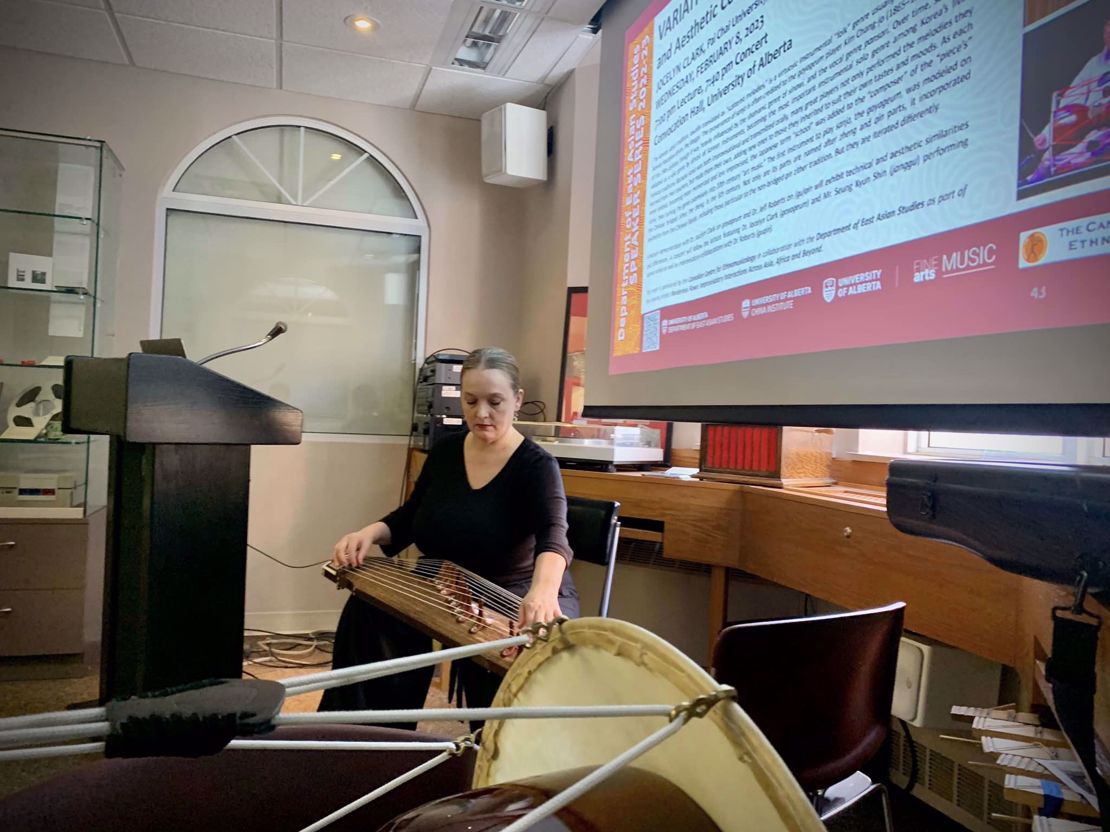
February 8-9, 2023
Variation and Virtuosity: Korean Gayageum Sanjo, and Aesthetic Connections with Chinese Qin traditions
The Korean sanjo tradition, usually translated as “scattered melodies,” is a virtuosic instrumental “folk” genre usually accompanied by the Korean hourglass drum, the janggu. The provenance of sanjo is often credited to the gayageum player Kim Chang-jo (1865–1920) at the end of the 19th century, though it was heavily influenced by the shamanic genre of sinawi, and the vocal genre pansori. Over time, sanjo was adopted as a solo genre by almost all Korean instruments, becoming the most important instrumental solo genre among Korea’s living musical traditions. Because sanjo was both improvisational and transmitted orally, many great players not only performed the melodies they learned from their teachers, but made them their own, adding new ones to those they inherited to suit their own tastes and moods. As each sanjo settled, becoming more memorized and less improvised, the Japanese term “school” was added to the “composer” of the “piece’s” name, thus turning the genre ostensively into 20th century “art music.”
The first instrument to play sanjo, the gayageum, was modeled on the Chinese bridged zither, the zheng, in the 6th century. Not only are its parts named after zheng and qin parts, it incorporated aesthetics from the Chinese literati, including those particular to the non-bridged qin zither tradition. But they are iterated differently.
A lecture demonstration with Dr. Jocelyn Clark on gayageum and Dr. Jeff Roberts on (gu)qin will exhibit technical and aesthetic similarities and differences. A concert will follow the lecture featuring Dr. Jocelyn Clark (gayageum) and Mr. Seung Kyun Shin (janggu) performing Korean sanjo as well as improvisatory collaborations with Dr. Roberts (guqin).
This event is sponsored by the Canadian Centre for Ethnomusicology in collaboration with the Department of East Asian Studies' 'Guest Speaker Series', and as an extension of the ongoing project ‘Borderless Flows: Improvisatory Interactions Across Asia, Africa and Beyond.’

September 14-17, 2022
Festival, Workshops and Conference
"Borderless Flows: Improvisational Interactions across Asia, Africa and Beyond"
Western cultural domination of the last several centuries has portrayed intercultural interaction from a Western-centric perspective, focused on an inexorable progression of empires, centers of cultural interaction, from Greece to Rome to Europe, to the exclusion of the history of intercultural interactions in other parts of the world, even those with extensive contact with Europe: Asia and Africa. In Western society and even in Western academia — South-South cultural interactions tend to be overlooked historically, and contemporary globalization tends to be viewed as a Western-centric phenomenon. How can we redress this Western-centric bias, resulting from a relatively recent history of Western colonialism and imperialism throughout the world? We address this problem through a series of research, research-creation and outreach/ community engagement activities that explore the borderless flows of people, goods, culture and music throughout Asia and Africa along Indian Ocean, Silk Road and trans-Saharan trade routes, from ancient times up until the present, and their impact on the entire world, including Europe and the Americas.
Schedule | Ensembles | Concerts | Workshops
Conference | Presenters | Partners